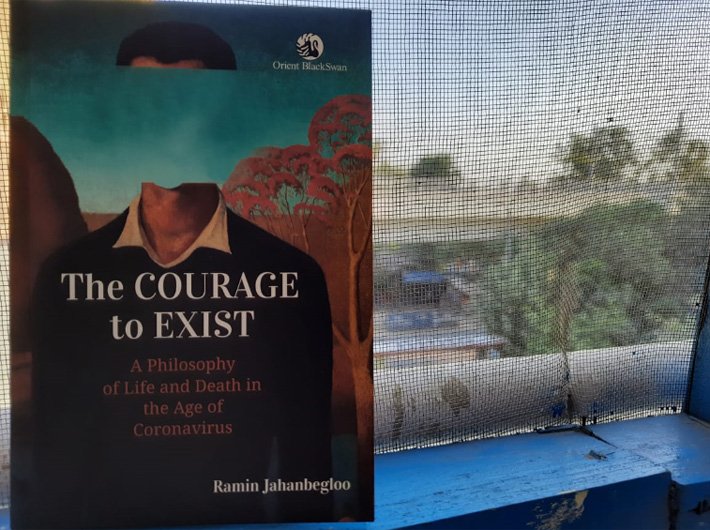Professor Jahanbegloo interrogates the meaning of life amid pandemic pandemonium
The Courage to Exist
A Philosophy of Life and Death in the Age of Coronavirus
By Ramin Jahanbegloo
Orient BlackSwan, 96 pages, Rs 195
When China witnessed a new epidemic at the beginning of the year, we did not panic. There had been at least four such epidemics in this century itself, creating a scare, but leaving majority of the world unhurt. As the year progressed, the new virus reached every continent, the death count started soaring, and we entered an unprecedented age – the Age of Coronavirus.
The world has seen countless plagues and pandemics before, but this is the first in our lifetime. And we are fumbling for answers to pressing questions. Be it trivial questions (how long to keep grocery aside) to deep ones (when and how it all will end), it is humbling to realise that there are no answers, nobody has seen anything of this nature before, and there are limits to human power and control.
As Philosopher Ramin Jahanbegloo is well aware, anxiety and misery we are living through are not due to simply the realisation of the limits of our species’ capabilities, but due to the real and present danger to the very survival of the species. Though we ignore the fact, human existence on this planet is inherently fragile. And we do not know how to live with and through this Age.
“To live and die is simple. But to know how to live and how to die is not,” Jahanbegloo writes. While there are simply no answers, philosophers, sages and seers can help us in learning to make peace with our questions, and may even direct us to paths which can help us come to terms with this special edition of human condition.
Jahanbegloo, an Iranian philosopher who is no stranger to India for long and is now teaching at the OP Jindal Global University, seems to have taken up the mission of making philosophical quest and wisdom available to more and more people outside the academic campuses. His latest work, The Courage to Exist (Orient BlackSwan), is in the similar vein.
The landmarks along a remarkable journey offered by this small volume are ‘Living’, ‘Suffering’, ‘Dying’, ‘Resisting’ and ‘Solidarity of the Shaken’. Our guides on the way include an eclectic collection of thinkers ranging from Plato and Aristotle to Thoreau and Schopenhauer. From more recent times, Weil and Heidegger, Adorno and Levinas also throw light along the way. From the East, other than Gandhi, the Buddha too could have been played a role. Works of imagination too are welcome: Reading Homer and Shakespeare can teach us how to accommodate the vicissitudes of life.
The first five chapters, in the tradition of intellectually uplifting self-help guides, equally work as an easy-flowing introduction to a stream of thought that takes philosophy as a way of life. Then, Jahanbegloo offers a thought to ponder upon before leaving us. It is a Greek word: Kairos.
“Ancient Greeks regarded Kairos as the opportune moment and the appropriate measure, as a critical point in time and space,” writes Jahanbegloo. Proposing the Age of Coronavirus as that opportune moment for mankind, a historical moment for stock-taking and course correction, he writes:
“The threat of the coronavirus should make us conscious of the existence of bigger threats that endanger human life. Among these, climate change is a deeper that will continue to be around the corner. It is time for humanity to understand that the consequences of its actions will be disastrous and catastrophic. What the coronavirus teaches us is that if humanity is to survive, this is the time for it to change its values, its prioirities, and its perspective.”
The platform that can achieve this nearly impossible task, for the author, is a politics that has the enlightened citizenry as its most crucial ingredient. It would have been worth the while to explore, following the Gandhian example, if certain traditions of religion and spirituality can aid such a conception of civic life. That will be a debate for another day.
This little volume, which is like a Covid-19 updated postscript to ‘Letters to a Young Philosopher’ (OUP, 2018), offers an exciting reading that not only provokes countless debates, but also explains models of ethical life in the face of an existential crisis. Indispensable reading for our times.
* * *
Read a review of Ramin Jahanbegloo’s ‘Letters to a Young Philosopher’
https://www.governancenow.com/news/regular-story/socratic-letters-to-a-young-philosopher
Also, here is an interview with the author, on his ‘The Decline of Civilization’ (Aleph, 2017)
https://www.governancenow.com/views/interview/mahatma-gandhi-and-rabindranath-tagore-are-the-two-indian-authors-who-redefine-civilisation-as-a-moral-compass-and-a-space-of-dialogue-decivilisation-ramin-jahanbegloo-brexit-donald-trump-right-wing-terrori

